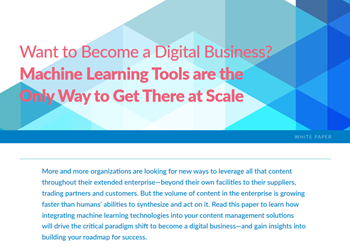Artificial intelligence (AI) now seems poised to take over the world sooner rather than later. In the last couple of years, developments in this area have advanced hugely, driven by advances in processing power and much wider availability of data.
But there's a lot of debate among scientists about exactly where this will lead. How big a step is it really from self-driving cars and a home assistant that knows what your favorite songs are to a sci-fi robot uprising?
Fortunately, there's lots of material out there to help anyone with an interest in AI and machine learning understand where we are, where we're going and what the risks might be. With this in mind, here are a few fascinating reads that are sure to give you a greater insight into the potential future of AI, so when the machines do take over the world, at least you'll know what to expect.
The Master Algorithm - Pedro Domingos
Pedro Domingos' introduction to machine learning - or "the scientific method on steroids", as he describes it - spells out how the technology actually relates to our everyday lives, and what the future will hold for it. Setting out the idea that one day, all knowledge in the world will be able to be derived from data, the work has some big-name fans, including Bill Gates, who named it as one of two must-reads for understanding AI.
Superintelligence - Nick Bostrom
The second of Bill Gates' tips, Superintelligence has won plaudits for how it tries to answer the question of what will happen if - or when - artificial intelligence surpasses our own. If Domingos' book offers an optimistic assessment of what machine learning will bring to our world, Bostrom offers a more cautious take.
The author is among those who have put their name to a much-circulated open letter to AI researchers urging caution in future developments, along with the likes of Elon Musk and the late Stephen Hawking. Indeed, Musk once tweeted:
"Worth reading Superintelligence by Bostrom. We need to be super careful with AI. Potentially more dangerous than nukes."
Our Final Invention - James Barrat
Another read that may be of interest to those worried about being displaced by machines, James Barrat's work also explores the potential pitfalls that may lie ahead if research into AI is allowed to continue unchecked. The author argues that if scientists achieve the 'holy grail' of AI development and actually create a technology that attains human-like levels of intelligence, with its own survival instincts, they could end up with a serious competitor to humans. In a worst-case scenario, it posits that it could lead to the end of the human era!
Life 3.0 - Max Tegmark
For a slightly less apocalyptic take of where the future of AI will leave humanity, MIT physicist Max Tegmark's Life 3.0: Being Human in the the Age of Artificial Intelligence poses the question of how we should direct the development of machine learning solutions to ensure they remain beneficial to society.
He picks out several key questions that we will have to answer in order to secure our own future from the rise of the machines, such as what goals we should be working toward and how AI devices should be viewed from a legal perspective. Life 3.0 is another book on Elon Musk's worth-reading list, with the tech entrepreneur noting:
AI will be the best or worst thing ever for humanity, so let's get it right.
Access the latest business knowledge in IT
Get Access







Comments
Join the conversation...